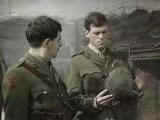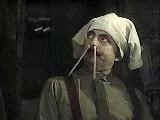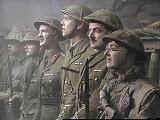|
|
|
High HopesFriday, June 30: The weather report is favourable for tomorrow. With God’s help, I feel hopeful. The men are in splendid spirits. Several have said that they have never before been so instructed and informed of the nature of the operation before them. The barbed wire has never been so well cut nor the artillery preparation so thorough. All the commanders are full of confidence.. Haig, Diary.
If the success of any operation were entirely dependent on the preparations made before Zero Hour, then the Somme should have been a complete success. Memories of Captain RJ Trounshell, Princess Victoria’s Fusiliers
The Futility of the Bombardment[Lt. George is in the trench, peering through a pair of binoculars across No Man's Land. There is a deafening noise from the artillery bombardment.] Blackadder: Oh, God, why do they bother? George: Well, it's to kill Jerry, isn't it, Sir? Blackadder: Yes, but Jerry is safe underground in concrete bunkers. We've shot off over a million cannon shells and what's the result? One dachshund with a slight limp! BlackAdder - Series 4, Episode 4
Our artillery hadn’t made any impact on those barbed-wire entanglements. The result was we never got anywhere near the Germans. Our lads were mown down. They were just simply slaughtered. You were either tied down by the shelling or the machine-guns and yet we kept at it, making no impact on the Germans at all. And those young officers, going ahead, they were picked off like flies. We tried to go over and it was just impossible. We were mown down. Memories of Corporal WH Shaw, Royal Welsh Fusiliers
Blackadder on the Insanity of ‘Going over the Top’In Blackadder Goes Forth: Captain Cook, Edmund Blackadder spends the entire episode trying to avoid taking part in an attack.
Blackadder: My instincts lead me to deduce that we are at last about to go over the top. [peers over the top of the trench with a periscope] George: Great Scott sir, you mean, you mean the moment's finally arrived for us to give Harry Hun a darned good British style thrashing, six of the best, trousers down? Blackadder: If you mean, "Are we all going to get killed?" Yes. George: Right! Bravo-issimo! Well let's make a start eh, up and over to glory, last one in Berlin's a rotten egg. Blackadder: Give me your helmet, lieutenant. [George hands his helmet to Blackadder, who throws it up into the sky. Immediately heavy machine-gun fire is heard. He catches the helmet, which now has over 20 holes in it, and gives it back to George.] BlackAdder - Series 4, Episode 1
And in the final episode of the series, Blackadder tries to avoid the ‘Big Push’ by feigning madness:
Blackadder: Hello; the Somme Public Baths -- no running, shouting, or piddling in the shallow end. Ah, Captain Darling. Tomorrow at dawn. Oh, excellent. See you later, then. Bye. (hangs up) Gentlemen, our long wait is nearly at an end. Tomorrow morning, General Insanity Melchett invites you to a mass slaughter. We're going over the top. George: (follows Edmund in) Oh, now, come on, Cap! It may be a bit risky (tries to speak in a rousing Cockney dialect, but fails miserably), but it sure is bloomin'ell worth it, gov'nor! Blackadder: How could it possibly be worth it? We've been sitting here since Christmas 1914, during which millions of men have died, and we've advanced no further than an asthsmatic ant with some heavy shopping…
The men are lined up waiting to go over the top. Everyone puts a foot forward. Baldrick: I have a plan, sir. Voice: On the signal, company will advance! Blackadder: Well, I'm afraid it'll have to wait. Whatever it was, I'm sure it was better than my plan to get out of this by pretending to be mad. I mean, who would have noticed another madman round here? (whistle blows) Blackadder: Good luck, everyone. (blows his whistle) (Everyone yells as they go over the top. German guns fire before they're even off the ladders. The scene changes to slow motion, and explosions happen all around them. [An echoed piano slowly plays the Blackadder theme.] The smoke and flying earth begins to obscure vision as the view changes to the battlefield moments later: empty and silent with barbed wire, guns and bodies strewn across it. [A bass drum beats slowly.] That view in turn changes to the same field as it is today: overgrown with grasses and flowers, peaceful, with chirping birds.) BlackAdder - Series 4, Episode 6
Charging the Machine-gunsI were in the first row and the first one I saw were my chum, Clem Cunnington. I don’t think we’d gone 20 yards when he got it straight through the chest. Machine-gun bullets. He went down, I went down. We got it in the same burst. I got it through the shoulder. I hardly noticed it at the time. I were so wild when I saw that Clem were finished. I got up and picked up my rifle and got through the wire into their trench and straight in front there was this dugout – full of jerries, and one big fellow was on the steps facing me. I had the Mills bomb [a hand grenade]. Couldn’t use my arm. I pulled the pin with my teeth and flung it down and I were shouting at them, I were that wild, ‘There you are! Share that between you!’ The I were off. It was hand to hand! I went round one traverse and there was one – face-to-face. I couldn’t fire one-handed, but I could use the bayonet. It was him or me – and I went first! Jab! Just like that. It were my job. And from there I went on. Oh, I were wild! Seeing Clem like that! We were climbing out of the trench, making for the second line, and that’s where they got me again just as I were climbing out, through the fingers this time, on the same arm. I still managed to get on. I kept up with the lads nearly to the second line. Then I got another one. It went through my tin hat and down and straight through my foot. Well, that finished it! Memories of Private Ernest Deighton, King’s Own Yorkshire Light Infantry
When the whistle went, I threw my rifle on top of the trench and clambered out of it, grabbed the rifle and started going forward. There were shell-holes everywhere. I must have fallen half-a-dozen times before I got to the first line, and there were lads falling all over the place. You didn’t know whether they were just tripping up, like me, or whether they were going down with bullets in them. Lucas went down. He was killed before he even got to the first trench. We had two brothers named Moxham and one of them was with us and, looking across, we see his brother coming to the opposite lip of the crater. We all shouted, ‘Come on, come on! Don’t stand there! That bloomin’ machine-gun’ll come round. He’ll catch you!’ But he just stood there a moment too long – and it did get him! He was killed there. Of course his brother didn’t know what to do with himself. Memories of Private Roy Bealing, Wiltshire Regiment
I’d just jumped into a trench between two men, Gomer Evans and Dick Darling, and as I jumped in there was this terrific crash. I didn’t know any more until I woke up a few minutes later, and there was old Gomer Evans, he’d got the top of his nut blown off, and Dick Darling, he’d got it in the back. His kidney’s blown out. We had to bury both of them. Memories of Corporal Horace Smith, Rifle Brigade
The biggest mistake that was made in training was that we were never told what to do in case of failure. All that time we’d gone backwards and forwards, training, doing it over and over again like clockwork and then when we had to advance, when it came to the bit, we didn’t know what to do! Memories of Sergeant Jim Myers, Machine Gun Corps
Horror at the Slaughter – Eyewitness CommentsMy memory was seared with the picture of the French and British attacking together on the Somme on July 1st 1916, the British rigid and slow, advancing as at a military parade in lines which were torn and ripped by the German guns, while the French tactical formations, quick and elastic, secured their objectives with trifling loss. It had been a terrible spectacle. As a display of bravery it was magnificent. As an example of tactics its very memory made me shudder. General Spears, Prelude to Victory (1920s)
Whatever was gained, it wasn’t worth the price the men had to paid to gain that advantage. It was no advantage to anybody. It was just sheer bloody murder. That’s the only words you can use for it. Memories of Corporal Harry Shaw, Royal Welsh Fusiliers
There was a terrible smell. It was so awful it nearly poisoned you. A smell of rotten felsh. The old German front line was covered with bodies – they were seven and eight deep and they had all gone black. These people had been lying since the First of July. Wicked it was! Bodies all over the place. I’ll never forget it. I was only eighteen, but I thought, ‘There’s something wrong here!’ Memories of Corporal Joe Hayles, Rifle Brigade
Haig on the First Day of the SommeVery successful attack this morning… All went like clockwork… The battle is going very well for us and already the Germans are surrendering freely. The enemy is so short of men that he is collecting them from all parts of the line. Our troops are in wonderful spirits and confidence. Written by Haig on 1st July 1916, the first day of the Battle of the Somme.
Lloyd George on the war of attritionThe tale of these battles… is the story of the million who would rather die than call themselves cowards – even to themselves – and also of the two or three individuals who would rather the million perish than they as leaders should admit – even to themselves – that they were blunderers. Ought I to have vetoed it? Ought I not to have resigned than allow this slaughter of brave men? I have always felt there are solid grounds for criticism in that respect. My only justification is that Haig promised not to press the attack if it became clear that he could not attain his objectives by continuing the offensive. Lloyd George,
War Memoirs (published after the War).
Communities DestroyedMy Dear Murray Up till now, I have made it a rule to write to the next of kin of any of our men who have fallen out here, but in the present circumstances it is beyond me to continue this practice. I have no course open to me but to ask you to send this letter to the Glasgow papers for publication. I should like to express to all the relatives of those who have died, my sincerest sympathy with them in their present sorrow. It may be some consolation to know that the battalion walked into actionas steadily as if it had been on the Parade ground, and I cannot adequately express my feeling of admiration for the spirit, gallantry, and daring with which all faced their terrible task. Sgt. David S Morton, Glasgow Chamber of Commerce Battalion
Kitchener had agreed that those who ‘joined together’ should ‘serve together’. And on the Somme they died together. In the industrial north of England, on Tyneside and in Ulster whole communities were plunged into mourning. The 10th West Yorks lost 22 officers and 688 men, the Accrington Pals 21 officers and 585 men, the 4th Tyneside Scottish 19 officers and 610 men. Their sacrifice was to little effect. JM Bourne, Britain and the Great War (1989)
Doubts About Haig’s TacticsThe heavy losses entailed by the fighting at the Somme were making their efforts felt at home, and sorrow, suffering and anxiety were undoubtedly weakening the resolve of some people. Murmurs were heard in the country. Mr Lloyd George, always sensitive to the breath of public opinion, was already feeling a lack of confidence in Haig and was no longer giving him his wholehearted support. Talk of finding another Chief was in the air, and suggestions were seriously made that we should fight our main battles in some other theatre of war than against the Germans. General Sir Hubert Gough, The Fifth Army (1931)
In late July, Churchill circulated a paper round the government ministers criticising Haig’s tactics and achievements: "We have not advanced 3 miles in the direct line at any point. We have only penetrated to that depth on a front of 8,000 to 10,000 yards. Penetration upon to narrow a front is quite useless for the purpose of breaking the line. In personnel the results of the operation have been disastrous; in terrain they have been absolutely barren… from every point of view the British offensive has been a great failure." From a paper circulated round members of the Cabinet by
Churchill, late July.
Soon after, Haig got a letter from his Chief of Staff in London, General Sir William Robertson, warning him of the developments: "The powers that be are beginning to get a little uneasy in regard to the situation. The casualties are mounting up. They will persist in asking whether I think a loss of say 300,000 men will lead to really great results." Robertson to Haig, 29 July 1916
Haig responded by outlining what he thought to be the achievements of the campaign. "Proof given to the world that the Allies are capable of making and maintaining a vigorous offensive and of driving the enemy’s best troops from the strongest positions has shaken the faith of the Germans. Also impressed on the world, England’s strength and determination, and the fighting power of the British race… The maintenance of a strong offensive pressure will eventually in the enemy’s complete overthrow." Haig to Robertson, 1 August 1916
Falling Morale at the FrontThe morale of the British and Empire troops, so high in the early summer, had descended to a low point. Before the Somme the supreme punishment in the Australian forces was to be sent home in disgrace; henceforth imprisonment had to be introduced. In October there were cases of desertion to the enemy among British troops, and the Germans had even been informed of an oncoming attack. The first officer to be tried and shot for desertion was ordered and executed in December. ‘No one’, a corps commander protested, ‘who has not visited the front can really know that state of exhaustion to which the men are reduced.’ Paul Guinn, British Strategy and Politics 1914 to 1918 (1965)
We were between the devil and the deep blue sea. If you go forward, you’ll likely be shot, if you go back you’ll be court-martialled and shot, so what the hell do you do? It was hell, it was impossible, utterly impossible. The only possible way to take High Wood was if the Germans ran short of ammunition. They couldn’t take it against machine-gunners, just ridiculous. We always blamed the people up above. We had a saying in the Army, ‘The higher, the fewer’. They meant the higher the rank, the fewer the brains. Memories of Private W Hay, Royal Scots Battalion.
|
|


